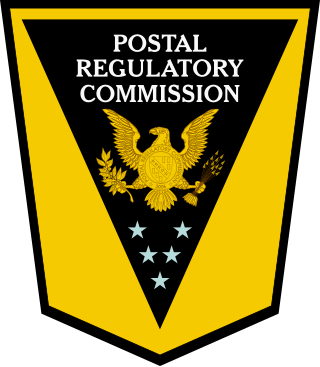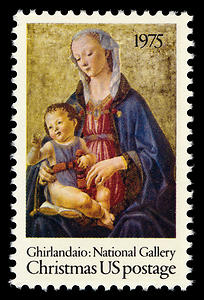Related Research Articles
An international reply coupon (IRC) is a coupon that can be exchanged for one or more postage stamps representing the minimum postage for an unregistered priority airmail letter of up to twenty grams sent to another Universal Postal Union (UPU) member country. IRCs are accepted by all UPU member countries.
The Universal Postal Union is a specialized agency of the United Nations (UN) that coordinates postal policies among member nations and facilitates a uniform worldwide postal system. It comprises 192 member states and is headquartered in Bern, Switzerland.

The United States Postal Service (USPS), also known as the Post Office, U.S. Mail, or Postal Service, is an independent agency of the executive branch of the United States federal government responsible for providing postal service in the United States, its insular areas, and its associated states. It is one of the few government agencies explicitly authorized by the Constitution of the United States. As of 2023, the USPS has 525,469 career employees and 114,623 non-career employees.

A video rental shop/store is a physical retail business that rents home videos such as movies, prerecorded TV shows, video game discs and other media content. Typically, a rental shop conducts business with customers under conditions and terms agreed upon in a rental agreement or contract, which may be implied, explicit, or written. Many video rental stores also sell previously viewed movies and/or new, unopened movies.

Blockbuster formerly called Blockbuster Video is an American multimedia brand and former rental store chain. The business was founded by David Cook in 1985 as a single home video rental shop, but later became a public store chain featuring video game rentals, DVD-by-mail, streaming, video on demand, and cinema theater. The logo was designed by Lee Dean at the Rominger Agency. The company expanded internationally throughout the 1990s. At its peak in 2004, Blockbuster employed 84,300 people worldwide and operated 9,094 stores.
Franking comprises all devices, markings, or combinations thereof ("franks") applied to mails of any class which qualifies them to be postally serviced. Types of franks include uncanceled and precanceled postage stamps, impressions applied via postage meter, official use "Penalty" franks, Business Reply Mail (BRM), and other permit Imprints (Indicia), manuscript and facsimile "franking privilege" signatures, "soldier's mail" markings, and any other forms authorized by the 192 postal administrations that are members of the Universal Postal Union.

Australia Post, formally known as the Australian Postal Corporation, is a Commonwealth government-owned corporation that provides postal services throughout Australia. Australia Post's head office is located on Bourke Street, Melbourne, above the Bourke Street Post Office.

The system for mail delivery in the United States has developed with the nation. Rates were based on the distance between sender and receiver in the nation's early years. In the middle of the 19th century, rates stabilized at one price regardless of distance. Rates were relatively unchanged until 1968 when the price was increased every few years by a small amount. Comparing the increases with a price index, the cost of a first-class stamp has been steady. The seal of the Post Office Department showed a man on a running horse, even as railroads and, later, motorized trucks and airplanes moved mail. In 1971, the Post Office became the United States Postal Service, with rates set by the Postal Regulatory Commission, with some oversight by Congress. Air mail became standard in 1975. In the 21st century, prices were segmented to match the sorting machinery used; non-standard letters required slightly higher postage.

The American Letter Mail Company was started by Lysander Spooner in 1844, competing against the legal monopoly of the United States Post Office.

GameFly is a privately held American online video game rental subscription service that specializes in providing games for Nintendo, Sony and Microsoft systems starting from the sixth generation onwards.
DVD-by-mail is a business model in which customers rent DVDs and similar discs containing films, television shows, video games and the like, ordering online for delivery to the customer by mail. Generally, all interaction between the renter and the rental company takes place through the company's website, using an e-commerce model. Typically, a customer chooses from a list of titles online and adds titles to a queue. As a customer's requested titles become available, the company sends them out. When the customer is finished with the disc, they mail it back to the company.
LoveFilm was a United Kingdom–based provider of DVD-by-mail and streaming video on demand in the United Kingdom, Sweden, Norway, Denmark and Germany.

Freepost is a postal service provided by various postal administrations, whereby a person sends mail without affixing postage, and the recipient pays the postage when collecting the mail. Freepost differs from self-addressed stamped envelopes, courtesy reply mail, and metered reply mail in that the recipient of the freepost pays only for those items that are actually received, rather than for all that are distributed. Freepost of preprinted cards issued by businesses is also different from postal stationery sold by postal administrations.

The United States Postal Regulatory Commission, formerly called the Postal Rate Commission, is an independent regulatory agency created by the Postal Reorganization Act of 1970. Like the Postal Service, it was defined in law as an independent establishment of the executive branch.
A flat fee, also referred to as a flat rate or a linear rate refers to a pricing structure that charges a single fixed fee for a service, regardless of usage. Less commonly, the term may refer to a rate that does not vary with usage or time of use.

Non-denominated postage is a postage stamp intended to meet a certain postage rate, but printed without the denomination, the price for that rate. They may retain full validity for the intended rate, regardless of later rate changes, or they may retain validity only for the original purchase price. In many English-speaking countries, it is called non-value indicator or non-value indicated (NVI) postage. Introduced to reduce the cost of printing large issues of low-value stamps to "top-up" old issues, NVI stamps are used in many countries.
Printed matter is a term, mostly used by mailing systems, normally used to describe mechanically printed materials for which reduced fees are paid which are lower than first-class mail. Each postal administration has its own rules for what may be posted as printed matter. In the Great Britain a special "Book Post" was introduced in 1848 that by 1852 had been extended to the wider range of material.

The uniform fourpenny post was a short-lived uniform pre-paid letter rate in United Kingdom of Great Britain and Ireland that lasted for 36 days from 5 December 1839 until 9 January 1840. The Uniform Fourpenny Post was the first component of the comprehensive reform to the Royal Mail postal service that took place in the 19th century.

United States airmail was a service class of the United States Post Office Department (USPOD) and its successor United States Postal Service (USPS) delivering air mail by aircraft flown within the United States and its possessions and territories. Letters and parcels intended for air mail service were marked as "Via Air Mail", appropriately franked, and assigned to any then existing class or sub-class of the Air Mail service.

The Post Office Act 1908 is an act of the Parliament of the United Kingdom
References
- ↑ "505 Return Services". Domestic Mail Manual . United States Postal Service . Retrieved 3 January 2013.
- ↑ Dignan, Larry (December 5, 2007). "U.S. Postal Service to Netflix: You're killing us on labor". ZDNet . Retrieved 3 January 2013.
- ↑ David M. Levy; Matthew D. Field; Alexandra Megaris; Seung-Hyun Ryu (2010). POST-HEARING BRIEF OF GAMEFLY, INC (PDF). Postal Regulatory Commission. Retrieved 3 January 2013.
That the Postal Service offers substantially different terms and conditions of service to GameFly and Netflix is obvious and indisputable. As discussed above, the Postal Service diverts most of the return mailers of Netflix from automated letter processing at no extra charge, while refusing to offer comparable terms and conditions of service to GameFly and other DVD rental companies. This disparity forces GameFly to incur $0.61 extra per mailer-trip in postage (the difference between the two-ounce flats rate of $1.05 and the one-ounce letter rate of $0.44), as well as additional amounts for the cost of a larger mailer with a protective insert, to achieve the bypass of letter automation that Netflix obtains at the one-ounce letter rate with no extra charge.